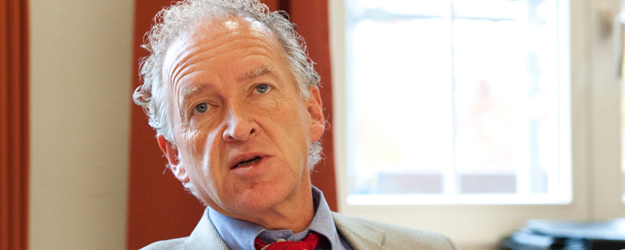5 December 2011
Friedemann Schrenk is the 13th scholar to hold the Johannes Gutenberg Endowed Professorship. His lecture series on paleo-anthropology for the summer semester 2012 will focus on the evolution of human beings. Under the title "Out of Africa: The Global History of Homo Sapiens" he wants to look at the spatial, biological and cultural connections that have led to the human beings of today.
In 1991, Professor Dr. Friedemann Schrenk discovered the lower jaw of one of the earliest examples of the genus "homo" in Malawi. He gained attention worldwide with this one-of-a-kind fossil that dates back 2.5 million years and is the oldest of its kind to date.
This is one of the reasons why the "Friends of Mainz University" have invited this Stuttgart native to come to Mainz as the 13th Johannes Gutenberg Endowed Professor. As he officially introduced Schrenk at the Johannes Gutenberg University, Professor Dr. Andreas Cesana, Chairman of the Johannes Gutenberg Endowed Professorship Foundation, commented that "from the very beginning, Mr. Schrenk was our favorite candidate." Cesana also noted that "he is one of the world's leading paleo-anthropologists. He is brilliant at sharing his knowledge, and he is totally dedicated to his discipline, to the university and to Africa."
Peter Radermacher, Chairman of the Friends of Mainz University, added: "We're just very proud today." According to Radermacher, the new endowed professor will enhance the university's reputation and attractiveness and will break new ground in terms of research and teaching.
The History of Homo Sapiens
Schrenk's lecture series for the summer semester 2012 is entitled "Out of Africa: The Global History of Homo Sapiens." "We are all Homo sapiens," said the paleo-anthropologist, "the question is rather how we see our origins." The place of our origin, at least for Schrenk and his colleagues, has been clear for some time: "There have been no finds that date back more than 2 million years that haven't come out of Africa." Yet, this paleo-anthropologist often faces a great deal of skepticism when he presents his "Out of Africa" thesis. "When I explain this in Europe, people still look at me strangely, even in Germany," he commented, "but I get even stranger looks in Africa."
The lower jaw from Malawi represents a crucial watershed in the evolution of modern mankind. This is a point Schrenk will touch on during the summer semester. "2.5 million years ago," he explained, "a kind of cultural evolution began at a place where environmental and climate changes were happening. The available food sources developed tough fibers and hard skins." In turn, an ancestor of today's humans, Homo robustus, developed huge teeth that could chew this food. But, as Schrenk maintains, "there were others who solved this problem differently, namely with culture – with tools." These gracile ancestors of Homo sapiens are classified today as Homo rudolfensis.
Awaken Awareness for Africa
Although the human genus spread around the world in several waves, the cradle of mankind has always been in Africa. This is why Schrenk also wants to use his lecture series to raise awareness about this continent. For decades, Schrenk has been working to correct a widespread misconception that, as he put it, "Africa doesn't have a history." Among his many efforts in this regard, he helped to establish a museum center in Karonga, Malawi where he still supports vocational training for specialists locally.
Like previous holders of the Johannes Gutenberg Endowed professorship, Schrenk will also be bringing all kinds of scholars from different disciplines to Mainz as part of his lecture series. Naturally, some of these will also be African colleagues. Schrenk declined to give any more details about who would be coming, but then he let something slip while answering a question about his very original tie which is decorated with hominid fossil skulls: "This was a gift from Richard Leakey whose wife Meave will be here this summer... darn it, I just gave something away." So, now we know that the famous paleo-anthropologist is definitely going to be one of the guest speakers.
The Professorship is a Gift to the University
Professor Dr. Mechthild Dreyer, the university's vice president, is convinced that Schrenk will show us "how controversial a seemingly remote topic can be." She also emphasized that "this endowed professorship is a really huge gift for us." It is indeed a large gift that has only been possible thanks to the private support of the Friends of the University. Each year, this foundation provides about EUR 50,000 to help cover the costs of the professorship.



